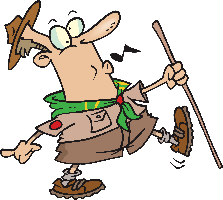Nasreddin and the Donkey Ride
| Category: | Turkey and Middle Eastern Tales |
|---|---|
| Notes: | A classic Nasreddin Hodja tale that highlights the futility of trying to please everyone and the importance of following one's own judgment. |
One sunny afternoon, Nasreddin Hodja decided to travel to a nearby village with his young son. They prepared their small donkey, packing a few belongings for the journey, and set off along the dusty road. Nasreddin, being older and wiser, climbed onto the donkey's back to ride comfortably while his son walked beside him.
As they entered the first town on their way, the villagers gathered to watch the pair pass by. Murmurs spread through the crowd, and Nasreddin could hear their whispers clearly. "Look at that selfish old man," one villager muttered. "He's riding comfortably while his poor young son has to walk! Shame on him!" Another voice chimed in, "How can a father be so thoughtless?"
Nasreddin glanced down at his son, who looked up at him with a puzzled expression. With a small sigh, Nasreddin decided to switch places. He climbed down from the donkey and helped his son into the saddle. Now the boy rode high on the donkey's back while Nasreddin trudged along on foot, the reins in his hand.
They continued on their way, but as they passed through the next village, Nasreddin noticed the villagers shaking their heads and frowning disapprovingly. "What kind of child makes his poor, elderly father walk while he rides?" one woman exclaimed, her tone harsh. "That boy has no respect for his elders at all!" A man added, "What a spoiled child! Making his father suffer while he sits there like a little prince."
Nasreddin glanced at his son again, who looked distressed by the criticism. Feeling a pang of confusion himself, Nasreddin stopped and lifted his son down from the donkey. "Let's both walk," he suggested gently. The boy nodded, and they continued side by side, leading the donkey as they went.
But it wasn't long before they reached yet another village, where a new group of onlookers began to laugh and point at them. "How foolish!" one man shouted, slapping his thigh in amusement. "They have a perfectly good donkey, but neither of them is riding it! What's the point of having a donkey if you're going to walk anyway?" Another villager added, "Are they afraid to use it? What nonsense!"
Nasreddin's son looked up at him, his eyes wide with frustration. "What should we do now, Father?" he asked softly.
Nasreddin scratched his head, a wry smile tugging at his lips. He decided to try something different. He lifted his son back onto the donkey, and then, with some effort, climbed up behind him. Together, they rode along the road, sharing the donkey's back.
Surely this would satisfy the villagers, Nasreddin thought. But as they rode through the next town, a loud outcry erupted from the villagers. "How cruel and heartless!" one woman cried, clutching her chest as if in pain. "Look at that poor donkey, struggling under the weight of two people!" Another voice joined in, "They're going to break its back! How can they be so unkind to an innocent animal?"
Nasreddin felt his shoulders sag in exasperation. No matter what he did, there seemed to be something wrong with it in the eyes of others. He glanced at his son, who looked equally bewildered. Taking a deep breath, Nasreddin made up his mind. He climbed down off the donkey, helped his son down as well, and then—much to everyone's astonishment—he bent down and lifted the donkey onto his own back.
The villagers gasped and burst into peals of laughter. "What a ridiculous sight!" they jeered. "Look at that silly old man, carrying a donkey instead of riding it! What nonsense is this?" The laughter echoed through the air as Nasreddin, his son walking beside him, staggered forward with the donkey awkwardly balanced on his shoulders.
After a few steps, Nasreddin carefully set the donkey down, his face flushed but his eyes twinkling with mischief. He turned to his son, who was now smiling in spite of himself. "You see, my boy," Nasreddin said softly, "no matter what you do, people will always have something to say. If you ride, they'll criticize you. If you walk, they'll call you foolish. Even if you carry the donkey, they'll find fault."
Nasreddin placed a hand on his son's shoulder and continued, his voice gentle but firm. "So, do what you think is best. Make your decisions based on your own judgment, not on the ever-changing opinions of others. People will always talk, but it's your own conscience and choices that truly matter."
The boy nodded slowly, understanding dawning in his young eyes. "I see what you mean, Father. Trying to please everyone will only lead to confusion and frustration."
"Exactly," Nasreddin agreed, smiling proudly. He lifted his son back onto the donkey and walked beside him once more. Together, they continued their journey, paying no mind to the curious stares and murmurs that followed them. Nasreddin's heart felt lighter, for he knew that his son had learned a valuable lesson that day—one that would guide him for the rest of his life.
The story of "Nasreddin and the Donkey Ride" spread quickly, becoming one of the most beloved and frequently told tales in the region. It was shared at gatherings and around firesides, where people would laugh at the image of Nasreddin carrying a donkey on his back, but they would also nod knowingly at the wisdom contained within the humor. From then on, whenever someone found themselves overwhelmed by the opinions of others, they would remember Nasreddin Hodja and his donkey, and they would say, "Don't carry the donkey just to please everyone." It became a reminder that true peace comes from listening to one's own heart and mind, rather than being swayed by the endless judgments of the world.

